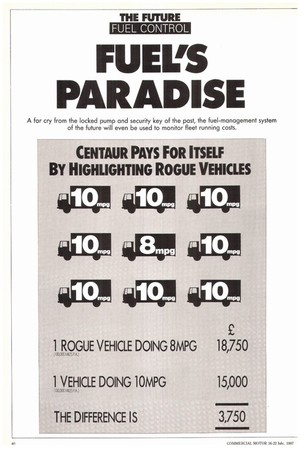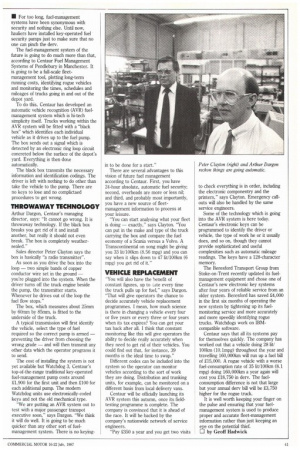FUEL'S PARADIS
Page 42

Page 43

If you've noticed an error in this article please click here to report it so we can fix it.
• For too long, fuel-management systems have been synonymous with security and nothing else. Until now, hauliers have installed key-operated fuel security pumps just to make sure that no one can pinch the derv.
The fuel-management system of the future is going to do much more than that, according to Centaur Fuel Management Systems of Pendlebury in Manchester. It is going to be a full-scale fleet management tool, plotting long-term running costs, identifying rogue vehicles and monitoring the times, schedules and mileages of trucks going in and out of the depot yard.
To do this, Centaur has developed an automatic vehicle recognition (AVR) fuelmanagement system which is hi-tech simplicity itself. Trucks working within the AVR system will be fitted with a "black box" which identifies each individual vehicle as it drives up to the fuel pump. The box sends out a signal which is detected by an electronic ring loop circuit concreted below the surface of the depot's yard. Everything is then done automatically.
The black box transmits the necessary information and identification codlings. The driver is left with nothing to do other than take the vehicle to the pump. There are no keys to lose and no complictaed procedures to get wrong.
THROWAWAY TECHNOLOGY
Arthur Dargon, Centaur's managing director, says: "It cannot go wrong. It is throwaway technology. If the black box breaks you get rid of it and install another, but really it should not even break. The box is completely weathersealed."
Sales director Peter Clayton says the box is basically "a radio transmitter".
As soon as you drive the box into the loop — two simple bands of copper conductor wire set in the ground — you're plugged into the system. When the driver turns off the truck engine beside the pump, the transmitter starts.
Whenever he drives out of the loop the fuel flow stops."
The box, which measures about 25mm by 60mrn by 85mm, is fitted to the underside of the truck.
A typical transmission will first identify the vehicle, select the type of fuel required so the correct pump is armed — preventing the driver from choosing the wrong grade — and will then transmit any other data which the operator programs it to send.
The cost of installing the system is not yet available but Watchdog 3, Centaur's top-of-the-range traditional key-operated fuel-management pump costs around 21,900 for the first unit and then 2100 for each additional pump. The modern Watchdog units use electronically-coded keys and not the old mechanical type.
"We are putting an AVR system out to test with a major passenger transpot executive soon," says Dugan. "We think it will do well. It is going to be much quicker than any other sort of fuelmanagement system. There is no keying There are several advantages to this vision of future fuel management according to Centaur. First, you have 24-hour absolute, automatic fuel security; second, overheads are more or less nil; and third, and probably most importantly, you have a new source of fleetmanagement information to process at your leisure.
"You can start analysing what your fleet is doing — exactly," says Clayton. "You can put in the make and type of the truck carrying the box and compare the fuel economy of a Scania versus a Volvo. A Transcontinental on song might be giving you 33 lit/100km (8.56 mpg) and you can say when it slips down to 47 lit/100km (6 mpg) you get rid of it."
VEHICLE REPLACEMENT
"You will also have the benefit of constant figures, up to rAate every time the truck pulls up for fuel," says Dargon. "That will give operators the chance to decide accurately vehicle replacement programmes. I mean, how much science is there in changing a vehicle every four or five years or every three or four years when its tax expires? You can get your tax back after all. I think that constant monitoring like this will give operators the ability to decide really accurately when they need to get rid of their vehicles. You could find out that, for instance, 39 months is the ideal time to swap."
Different codes can be included into the system so the operator can monitor vehicles according to the sort of work they are doing. Distribution and trunldng units, for example, can be monitored on a different basis from local delivery vans.
Centaur will be officially launching its AVR system this autumn, once its fieldtesting programme is complete. The company is convinced that it is ahead of the race. It will be backed by the company's nationwide network of service engineers.
"Pay 2350 a year and you get two visits to check everything is in order, including the electronic componentry and the printers," says Clayton. Emergency callouts will also be handled by the same service engineers.
Some of the technology which is going into the AVR system is here today. Centaur's electronic keys can be programmed to identify the driver or vehicle, the type of work he or it usually does, and so on, though they cannot provide sophisticated and useful complexities such as automatic mileage readings. The keys have a 128-character memory.
The Beresford Transport Group from Stoke-on-Trent recently updated its fuelmanagement equipment and chose one of Centaur's new electronic key systems after four years of reliable service from an older system. Beresford has saved 24,000 in the first six months of operating the new system by tightening up its fuelmonitoring service and more accurately and more speedily identifying rogue trucks. Watchdogs work on IBMcompatible software.
Centaur says that all its systems pay for themselves quickly. The company has worked out that a vehicle doing 28 lit/ 100krn (10.1mpg) throughout the year and travelling 160,0001cm will run up a fuel bill of 215,000. A rogue vehicle with a worse fuel-consumption rate of 35 Lit/1001cm (8.1 mpg) doing 160,0001on a year again will cost you 218,750 in derv. The fuelconsumption difference is not that large but your annual dery bill will be 23,750 higher for the rogue truck.
It is well worth keeping your finger on the pulse and ensuring that your fuelmanagement system is used to produce proper and accurate fleet-management information rather than just keeping an eye on the potential thief.
by Geoff Hadwick












































































